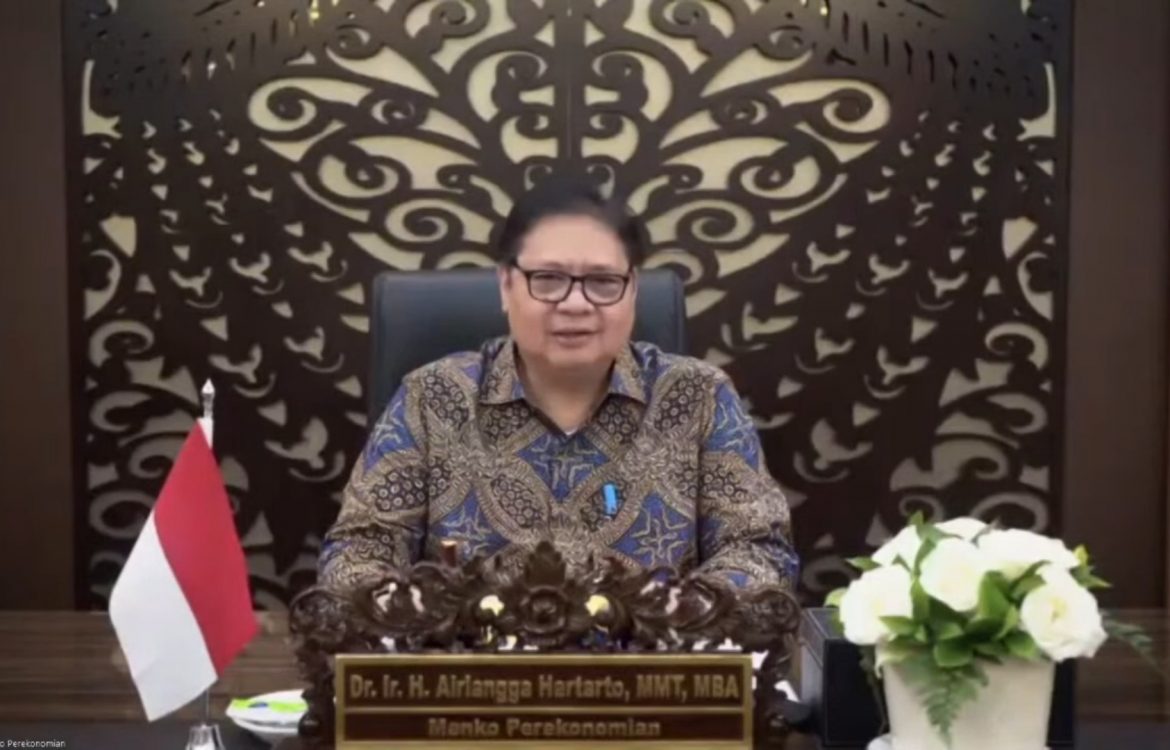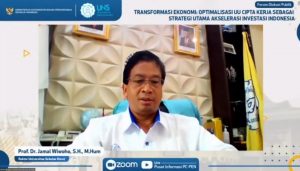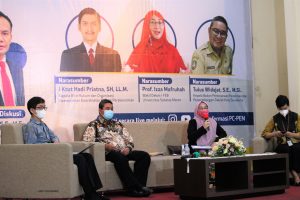
Coordinating Minister for Economic Affairs Encourages Academicians to Support UU Cipta Kerja
The ratification of the UU Cipta Kerja and its supporting law is a form of government’s commitment in realizing the structural reform. This become the effort to simplify, synchronize, and create more effective law from the many applicable regulations, which usually create investment problems.
This was delivered by the Coordinating Minister for Economic Affairs, Dr. (HC) Airlangga Hartarto, M.B.A., M.M.T., in the national seminar on Economic Transformation: Optimization of UU Cipta Kerja (Job Creation Law) as Key Strategy for Indonesia Investment Acceleration, organized by the Faculty of Economics and Business (FEB) Universitas Sebelas Maret (UNS) Surakarta, on Tuesday (30/3/2021). This event was held offline in Ruang Aula Seminar (Seminar Hall) FEB UNS and lived broadcasted on PC-PEN Information Center YouTube channel.
The event’s keynote speaker was the Coordinating Minister for Economic Affairs, Dr. (HC) Airlangga Hartarto, M.B.A., M.M.T. The Rector of UNS, Prof. Dr. Jamal Wiwoho, opened the event led by Susiwijono, M.E., and other three speakers, I Ktut Hadi Priatna, S.H., LL.M., Prof. Izza Mafruhah, and Tulus Widajat, S.E., M.Si.
 In his remark, the Rector of UNS stated that the Covid-19 pandemic affects the health sector and economic sector alike. This disturbance can be observed from the increasing numbers of unemployment in Indonesia amid the pandemic. To solve this issue, the government needs to open job opportunities for the community. Inviting foreign investors to Indonesia is a means to achieve this objective. “The larger the number of investors entering (Indonesia), the more jobs will be available for the community,” Prof. Jamal said. Prof. Jamal also mentioned the role of MSME in post-Covid economic recovery and asked the government to support MSME in Indonesia to enter formal sectors, thus, facilitating the small business to achieve permit and bank loans.
In his remark, the Rector of UNS stated that the Covid-19 pandemic affects the health sector and economic sector alike. This disturbance can be observed from the increasing numbers of unemployment in Indonesia amid the pandemic. To solve this issue, the government needs to open job opportunities for the community. Inviting foreign investors to Indonesia is a means to achieve this objective. “The larger the number of investors entering (Indonesia), the more jobs will be available for the community,” Prof. Jamal said. Prof. Jamal also mentioned the role of MSME in post-Covid economic recovery and asked the government to support MSME in Indonesia to enter formal sectors, thus, facilitating the small business to achieve permit and bank loans.
The Coordinating Minister for Economic Affairs, Dr. (HC) Airlangga Hartarto, M.B.A., M.M.T. stated that the Indonesian economy started to enter the recovery. “The signs of economic recovery are observable, reflected from PMI Manufacture above 50 or 50 plus 9 expansive level and investment realization and manufacture in 2020 was higher than previous years,” Dr. Airlangga said. He added that the proportion of consumption to saving continues to increase, and the Composite Stock Price Index (IHSG) and Foreign Exchange have returned to pre-pandemic level.
Several international institutions, such as the World Bank, have predicted that economic growth in 2021 will reach 4.4% – 5.1% and in 2022 between 4.8% – 6.0%. This projection is in line with the government target in 4.5% – 5.3% level, supported by the mass vaccination program, national economic recovery program, and implementation of Law (UU) on Cipta Kerja (Job Creation) and Covid-19 handling. The government will take various efforts to reduce the pandemic impact, maintain health and economic condition to improve people’s trust, and increase consumption and investment in 2021.
The government strategy in this matter is, first, acceleration in vaccination until 10.49 million dosages by 28 March 2021, with the first dosage for 7.25 million people and the second dosage for 3.2 million people. This program will be encouraged to achieve herd community in one year. Besides vaccination, the government applies the limitation for micro-community activities consistently to control the number of new Covid-19 infections by balancing social and economic aspects.
The second strategy is the commitment to continue pouring funds for Covid-19 handling and national economic recovery in 2021 by allocating IDR 699.43 trillion funds, which increased from IDR 579.78 trillion last year (20%). As a form of commitment to structural reformation, the government has ratified UU Number 11 of 2020 that simplifies, synchronizes, and improves the effectiveness of large and complicated regulations that often hinder new businesses’ investment.
UU Ciptaker grants business permits that initially licensing-based to risk-based. This reformation will create a more efficient and transparent government service. Dr. Airlangga said that all parties are open to capital investment, and it has protected MSME. The government also increase direct investment that forms sIndonesia’s investment authority. Concluding his material, Dr. Airlangga stated that the government needs collaboration from all stakeholders to implement the new regulation. He also congratulated UNS on the success of this national seminar.

